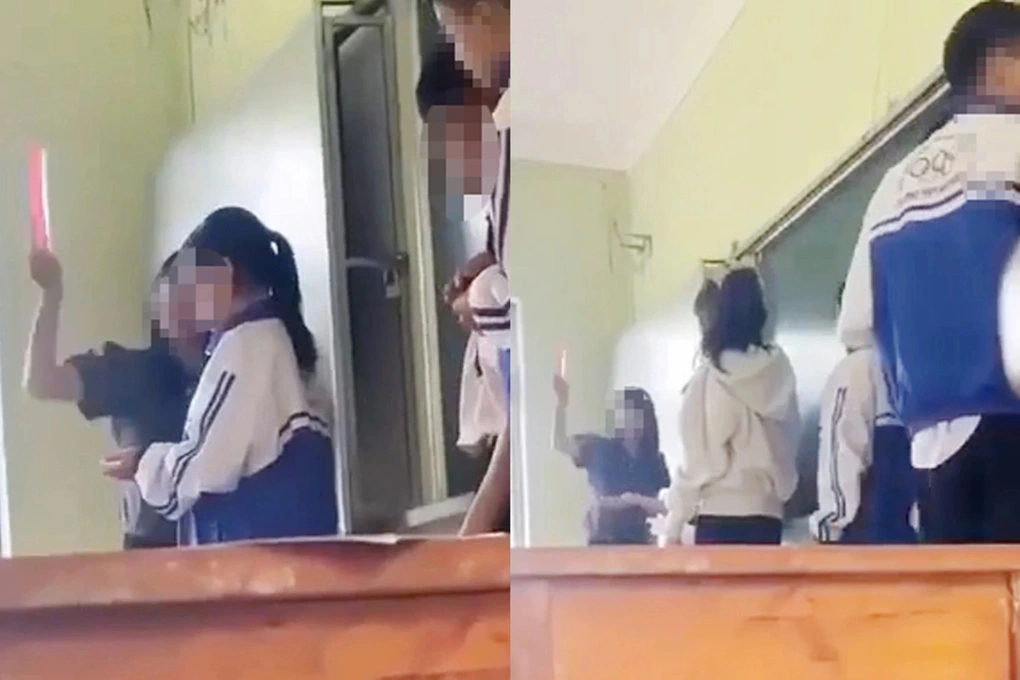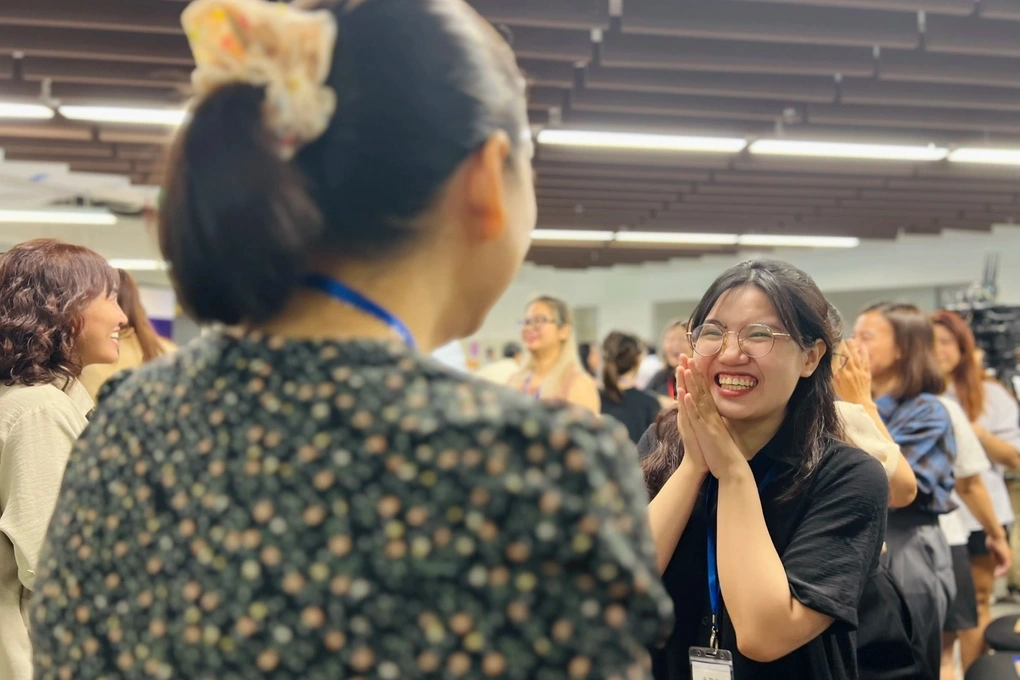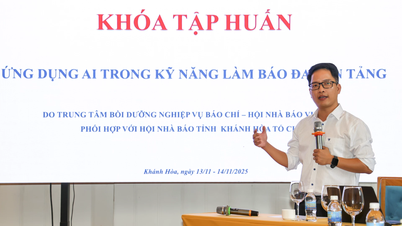In recent days, the incident of a female teacher at PTHB (born 2003) using a ruler to repeatedly hit a student's hand in Gia Lai and being fired has attracted many opinions.
Besides sympathetic perspectives, sharing with the teacher about her lack of pedagogical skills, many people in the profession were surprised when a young teacher of the 2K generation (the term for those born between 2000 and 2009), who had just graduated, calmly used corporal punishment in teaching.
If "beating" were all that was needed, no one would need to learn pedagogical skills.
Ms. Nguyen Thi Thanh Phuong, a secondary school teacher in Ho Chi Minh City, shared that after more than 20 years of teaching, after the incident, she was not too surprised if this was an older teacher, many teachers of the same generation as Ms. Phuong still had the mindset of teaching with a whip. But Ms. Phuong was surprised because this was a young teacher, just out of school.

Female teacher in Gia Lai was forced to quit her job for hitting a student on the hand (Photo: Cut from clip).
In this incident, Ms. Phuong paid attention to the information that if any student answered incorrectly or did not do their homework, Ms. B. would use a ruler to hit their hand many times. And in particular, the female teacher and the student had agreed that if they did not do their homework, they would be hit with a "hand slap".
"I was surprised and shocked that a teacher would negotiate with a student about committing a wrong act. Her beating of the student was not a "moment of anger" but was used as a pedagogical method," Ms. Phuong confided.
Ms. Thanh Phuong asked the question, as a newly graduated teacher, how did she approach the methods of educating students in training? Training in teacher training colleges in recent years has paid much attention to modern, active educational methods as well as paying attention to protecting children's rights.
According to Ms. Phuong, a young teacher just out of school usually enters the profession with enthusiasm and freshness. But here, the teacher agreed to “beat the student” - an act that lacks the heart and skills of a teacher, and violates the law on children and industry regulations.
Ms. Phuong wondered, does a young teacher using corporal punishment as an educational method come from flawed training or does she bring her own experiences into teaching?
Ms. Phuong admitted that in the past, during her teaching career, she sometimes used “the whip” but gradually had to change and find other educational methods. Violating students’ bodies is not an educational method, it is against the law, it is detrimental to her profession and dangerous for her.
There were times when she lost control and tapped a student's hand during class, but she would apologize immediately and not consider it a way to teach her students. When faced with students' problems, it is necessary to consider where they are struggling, how to support them, and what the teacher's responsibilities are.
In the above case, the student answered incorrectly, did not do the exercise, the teacher must see why the student answered incorrectly, why did they not do the exercise? Did the student not understand the lesson, could not do the exercise or was stuck at some stage?
“If just hitting students would make them answer correctly, do their homework completely, and be obedient, then there would be no need for teacher training schools, and teachers would not need to improve their expertise, qualifications, and pedagogical skills,” Ms. Phuong shared.
Pedagogical input also needs to be considered.
Mr. Bui Khanh Nguyen, an independent education expert in Ho Chi Minh City, said that the teachers' behavior may stem from their own experiences. They may have been beaten at home and at school, so they do not believe in democracy and respect for students, and they believe in the authority of teachers.
In addition, Mr. Nguyen raised the issue that teacher training colleges may be recruiting the wrong people at the entrance stage. Most schools do not interview, only recruit based on exam scores, which is a mistake in the mechanism of "selecting seeds" for the profession. Then maybe the things they learn at school do not help them enlighten themselves.
In fact, according to Mr. Nguyen, teachers trained from pedagogical schools who behave like the teacher above are not rare.

Teachers in Ho Chi Minh City in a seminar on improving pedagogical skills (Photo: Hoai Nam).
Regarding the incident of a teacher using a ruler to hit a student, Dr. Nguyen Thi Thu Huyen, former lecturer at Ho Chi Minh City University of Education, shared that the teacher's desire for her students to do better was legitimate and her intentions were good.
But the teacher's actions were certainly not correct in terms of both general law and education regulations. And she had to suffer the immediate consequence of being forced to quit her job.
Dr. Nguyen Thi Thu Huyen said that we sympathize with the pressure of teachers, but sympathy does not mean accepting wrong behavior.
Emotionally, Ms. Huyen felt both pity and anger towards the teacher in the above incident. Therefore, she questioned where she was educated as well as what made her choose such a “risky” way of education.
According to Ms. Huyen, in fact, more or less, those inappropriate behaviors partly reflect the fact that teachers have not been properly trained in classroom management and student behavior management.
In classroom management, student behavior management is not simply a few measures, "tricks", "secrets" to "control" students immediately, it is a whole system of pedagogical science that needs to be equipped for teachers.
In other words, teachers need to be equipped with a mindset, skill set, and tool set to effectively educate students without harming themselves, their students, or the school environment.
Ms. Huyen emphasized: "This training is not a one-time thing. In this era, nothing can be learned once and used for life. Each person must learn, equip themselves regularly, and update themselves with new things to be able to pursue a long-term career."
Source: https://dantri.com.vn/giao-duc/cho-thoi-viec-co-giao-dung-thuoc-danh-hoc-sinh-cach-giao-duc-day-rui-ro-20251113065016356.htm





![[Photo] The "scars" of Da Nang's mountains and forests after storms and floods](https://vphoto.vietnam.vn/thumb/1200x675/vietnam/resource/IMAGE/2025/11/13/1762996564834_sl8-jpg.webp)






















![[Photo] Prime Minister Pham Minh Chinh attends a conference to review one year of deploying forces to participate in protecting security and order at the grassroots level.](https://vphoto.vietnam.vn/thumb/1200x675/vietnam/resource/IMAGE/2025/11/12/1762957553775_dsc-2379-jpg.webp)

































































![Dong Nai OCOP transition: [Article 3] Linking tourism with OCOP product consumption](https://vphoto.vietnam.vn/thumb/402x226/vietnam/resource/IMAGE/2025/11/10/1762739199309_1324-2740-7_n-162543_981.jpeg)







Comment (0)